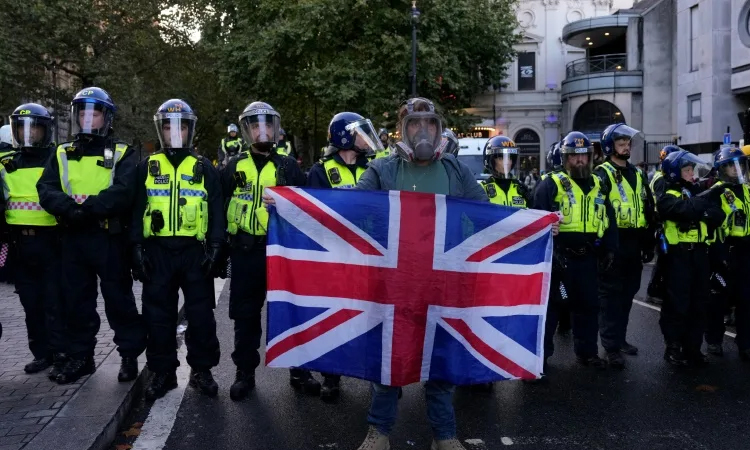News Flash
News Flash

LONDON, Sept 17, 2025 (BSS/AFP) - Once a far-right pariah, activist Tommy Robinson attracted up to 150,000 protestors to a weekend march in London, triggering soul-searching in Britain about the mainstreaming of fringe politics.
The large numbers seen on Saturday came as a shock to many in the country and raised questions about the implications for the future of British politics and society.
- How was Robinson able to attract so many people? -
Despite his reputation, criminal past and bouts of thuggery, Robinson was able to mobilise huge numbers.
"We were looking at something that was kind of a perfect storm," Matthew Feldman, visiting professor at Liverpool Hope University and expert on far-right extremism, told AFP.
The march took place amid public anger over the large numbers of migrants crossing the Channel in small boats, the housing of asylum seekers in hotels, a deepening row about free speech and continued economic stagnation.
"The angry protests outside asylum hotels are now metastasising into a simpler, broader message: stop immigration, defend free speech, revive Christianity," Trevor Phillips, former head of the Commission for Racial Equality (CRE), wrote in The Times on Monday after attending the march.
"It is a compelling trinity for a country that feels angry and unmoored," he said.
But Feldman pointed out that previous, smaller, marches have taken place during similarly febrile times and that the most significant factor boosting Robinson's is, "without doubt, is the reach that he's afforded on X", whose owner Elon Musk spoke at the rally via video link.
- Who was at the march? -
Robinson's hardcore support from his days as a football hooligan were in attendance, with sporadic violence breaking out during the day.
Phillips reported that the attendees were also largely working-class people and the rural middle-class.
There was plenty of firebrand rhetoric on stage from figures of the global far-right movement, such as French politician Eric Zemmour, who spoke about "the great replacement of our European people by peoples coming from the south and of Muslim culture".
Musk also told the crowd that "massive uncontrolled migration" was contributing to the "destruction of Britain", adding that "violence is coming" and that "you either fight back or you die".
The British government slammed his comments as "dangerous and inflammatory".
- Has the far right gone mainstream? -
The rally is a "worrying sign of mainstreaming and emboldening," Aaron Winter, of Lancaster University, told AFP.
While the end of summer usually marks the end of "marching season" and an expected seasonal reduction in the small boat crossings promises calmer times, it would be wrong to think the issue has gone away, said Feldman.
"Tommy Robinson, probably today, is looking around and saying, 'you know, that was a real success'," he added, explaining that having Musk's support gave him "tools" he did not have a decade ago.
The number of people in prison for far-right terror incidents in Britain stands at 75, a rise from 42 in 2020, according to official figures.
- What are the political implications? -
The Reform UK party, led by Brexit figurehead Nigel Farage, has also capitalised on public anger over immigration and is a heavy favourite to form the next government, although an election is not expected for another four years.
"The far right has momentum. For starters, Reform UK is getting closer to 40 percent polls, and no one is able to stop it," said Georgios Samaras, from London's King's College.
"Reform is here to stay," he added.
But Farage dismisses Robinson as an extremist and has been criticised by Musk for not being hardline enough, hinting that governing will not be straightforward.
The "mainstreaming of the far-right" has already had a political effect, with both main parties "chasing that vote" and talking tough on immigration, added Winter.
- How can extremism be countered? -
Left-wing Labour MP Clive Lewis wrote on social media that "pretending" all those in attendance were "racists or fascists would be a massive mistake", and called for progressives to offer a "story of renewal" in order to lure them away from far-right figures.
Feldman said that repairing the "dividing line between mainstream and extreme, has never been more important."
"At the height of World War II, George Orwell... said, 'not all of us can have a direct influence on the war, but our duty at home is to keep our little corner clean'," he added.
That could include "working with communities who might be at the sharp end, standing with them, standing up for British values of tolerance and multiculturalism.
"The floodwaters are rising, but let's not go weak at the knees," he said.